[The establishment and free exercise] clauses [of the First Amendment to the U. S. Constitution] have nothing of substance to say on questions of religious freedom. The original meaning supplies us neither with concrete answers to particular legal questions nor with any general principle, norm, value, or theory that might serve as a basis for working out such answers." (Stephen Smith, Foreordained Failure: The Quest for a Constitutional Principle of Religious Freedom, 16)
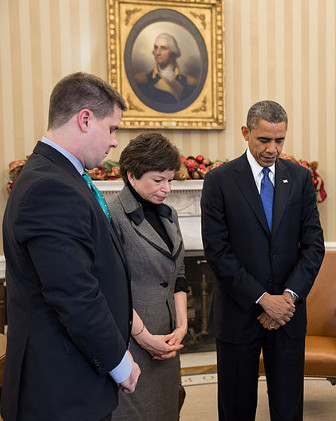
Official minute of silence
at the White House, after
the Sandy Hook shooting
“They have mouths,
but they cannot speak...”
(Psalm 115:5)
There are many Christians (mostly based in the United States) who are strongly promoting (so-called) religious liberty. Recently, many Christian businesses have been targeted by opportunistic lawsuits when the business owners refused the custom of some legally-favored group. Sometimes Christians involved in the government schools will experience some sort of restrictions on their speech or behavior, such as not being allowed to organize "official" prayers at sporting events. Christian pastors have had their sermons subpoenaed. This supposedly creates a "chilling effect" on speech. 1
Mainstream Christian groups now champion these causes, pay their legal bills and fines, and offer prayers and sympathy. They complain loudly about the civil government violating the "religious liberty" of Christians. They invoke the First Amendment to the U.S. Constitution as if it were still relevant to any modern court decisions (it isn't), and complain that the "free exercise" of their religion is being impeded (which it is, of course).
Here's the problem: "Religious liberty," in the sense of the "free exercise of any religion by an individual" is a myth, full stop. It is a promise that can never be fulfilled. A "religion", defined broadly, is simply a transcendent ethical framework.2 When the civil government enacts any law, it is enforcing one particular "religious" view of crime and punishment. Liberty is strictly defined by what that law allows and disallows.
For example, English Common Law (the basic legal framework of the early United States) differs from Biblical Law in many respects. Sharia Law (which has more than one "school" of interpretation) is completely different from European Community Law. But all of these legal frameworks establish a particular "religious" view of crime and punishment. It is possible (and Biblical) to separate church and state. It is impossible to separate religion and state.
Legal ideas have consequences. American Christians have already swallowed an unBiblical legal idea: that the civil government is somehow authorized by God to penalize a business for refusing to engage in a business transaction (now labeled as "discrimination"). You, citizen, are allowed to "discriminate" against a private business, by refusing to patronize them. You still have your "liberty"; but most business owners no longer have this liberty which you take for granted.
When the time came, Christians did not stand up for the "liberty" of the business owner against the coercive power of government. They supported unBiblical laws which removed the "liberty" of the business owner to do business voluntarily.3
One does not have to be a racist to recognize that the federal government has no constitutional authority to prohibit racial or any other kind of discrimination by private parties. Moreover, the true test of one's commitment to freedom of association doesn't come when he permits people to associate in ways he deems appropriate. It comes when he permits people to voluntarily associate in ways he deems offensive. (Walter Williams, "The Right to Discriminate")
Now, those same Christians are trying to claim a special category of "liberty," which they label as "religious liberty." And they wonder why the civil government isn't giving them the freedom which they previously denied to others.
In other words, there is no "religious liberty" which can stand independently from "liberty" by itself (without the misleading modifier "religious"). If you, fellow Christian, are arguing for "religious liberty," you will never be able to win, because you are engaging in hypocrisy (whether or not you are fully aware of it). On the other hand, if you argue for "liberty" you still probably won't win (in the United States): we are living with the consequences of centuries of Christian sin, which has brought us under a tyrannical government. But at least you will be using the right (principled, consistent, and historically-defensible) arguments, and you won't be confusing people with legal hypocrisy. It is still important for you to be a truthful ambassador of your King.
Here's another historical example that ought to resonate with every Christian: marriage.
Obergefell v. Hodges (2015)
In 2015, the U.S. Supreme Court decided a case called Obergefell v. Hodges. James Obergefell sued the Ohio Health Department to change the wording on a death certificate for John Arthur. Mr. Obergefell wanted to be listed as John Arthur's "surviving spouse." If Ohio didn't do this, Mr. Obergefell said that he would be denied "over 1000 federal benefits, privileges, and responsibilities," which would result in "severe harm" to him (Obergefell et al v. Kasich et al, pp. 5, 7). The Supreme Court heard his complaint, and a five justice majority took this opportunity to change the U.S. federal government's definition of marriage.
Many prominent Christians have objected to this decision. Presidential candidate Mike Huckabee called it "judicial tyranny." Al Mohler (president of the Southern Baptist Theological Seminary) called it "damaging" and "devastating." Both Christians and non-Christians now predict that Obergefell will be used as the basis for lawsuits against Christian businesses and other organizations which hold to a different definition of marriage (such as Christian schools and possibly churches). Some even say that the Obergefell precedent will eventually lead to legalized polygamy. Well, with over "1000 federal government benefits and privileges" now apparently riding on being labeled as "married", why wouldn't the polygamists try?
Reynolds v. United States (1878)
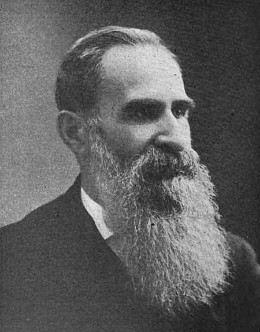
George Reynolds,
LDS polygynist
But here's the funny (as in tragic) thing: they already did, over a century ago. It's a strange irony that the very first "religious freedom" case decided by the United States Supreme Court also had to do with the definition of marriage. Way back in 1874, the Mormons believed (foolishly) that the First Amendment "free exercise" clause protected their religious liberty to define marriage according to the Bible and act upon that definition. Of course, the Mormons were taking their definition of marriage strictly from the Hebrew Scriptures, following the precedent of people like Abraham, Jacob, and King David. Back then God's law explicitly allowed polygyny (one husband, multiple wives): see Exodus 21:10.
Now don't go jumping to conclusions: I certainly don't support polygyny (Jesus outlawed it in Matt. 19:9). But you need to understand this incident with the Mormons so that you understand why Christians need to repent on the issue of civil government involvement with marriage.
At that time, polygyny had been made illegal in all federal territories (including Utah, which was then a territory) by the Morrill Anti-Bigamy Act (enacted into law in 1862). Despite the law, the Mormons had been left to their religious practices by the federal government for many years. But the LDS leadership (foolishly) believed that they could invoke the First Amendment to challenge the Constitutionality of Morrill's law.
For them, polygyny was an important religious obligation. Weren't they guaranteed the "free exercise" of their religion? Wasn't the federal government prohibited from establishing a particular religious definition of marriage? So they chose an elder named George Reynolds to turn himself in, voluntarily, to the authorities as a bigamist lawbreaker.
The Supreme Court, in Reynolds v. United States (1878) ruled against them. The Mormons discovered that the United States federal government had already established a definition of marriage, and it was the mainstream Christian one, which labeled Abraham, Jacob, David, and polygynist Mormons as law-breakers.
Chief Justice Waite wrote the court's decision. He made it clear that the federal government absolutely can regulate religious practice:
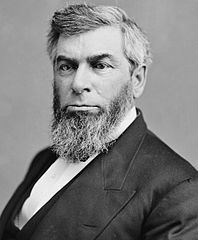 Congress was deprived of all legislative power over mere opinion, but was left free to reach actions which were in violation of social duties or subversive of good order. (Reynolds v. United States, 1878)
Congress was deprived of all legislative power over mere opinion, but was left free to reach actions which were in violation of social duties or subversive of good order. (Reynolds v. United States, 1878)"Social duties." "Good order." These words are used to justify every new law that is created. Every civil government must enforce its laws, and since different religions take different positions on various laws (like the definition of marriage), the civil government cannot possibly be "neutral" with respect to every religious practice. Practice, by the way, includes speech. In some places, you can actually be fined up to $125,000 for using the wrong pronoun.
The illusion of "free exercise" of religion
At this point you are probably going to protest: "I was taught that the Constitution guarantees the free exercise of religion. It says so right there in the First Amendment! That was the 'original intent' of the Founders, and that's what we should go back to."
Unfortunately, you have been sold an illusion. This illusion is easy to correct, just by looking briefly at the history:
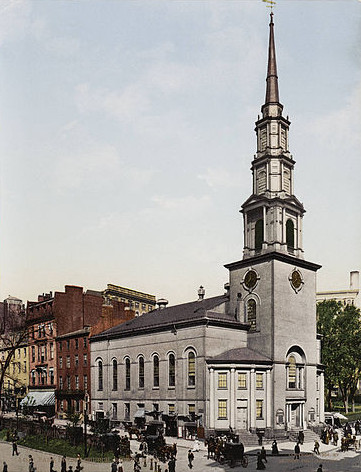
Park Street Church, Boston, MA
Tax-funded until 1833
The First Amendment says: "Congress shall make no law..." That phrase never meant: "the states can make no law." And the states had already made plenty of laws (many of them expressly contradicting Biblical law, by the way). The United States that existed when the First Amendment was ratified (1791) was arguably more diverse, in terms of actual religious practice, than our nation today. Some states (e.g. Connecticut and Massachusetts) even had established churches which were still receiving government funding, decades after the adoption of the First Amendment. The First Amendment never prohibited the sinful practice of stealing tax money from citizens in order to fund churches, it only prohibited the federal government from doing so. Some states even had "religious tests" for public office (which were only prohibited for federal offices by Article VI, Clause 3, of the Constitution).
Here's the bottom line on the "establishment" and "free exercise" clauses: they were intended to leave the religious "status quo" in place, keeping the federal government (which at that time was still very weak) from interfering with the various church/state arrangements already in place, in the individual states. The First Amendment restrictions were purely "jurisdictional." The legal scholar Steven Smith, in his excellent book Foreordained Failure writes:
The religion clauses kept the national government out of religion not because governmental support for religion was generally regarded as improper — that was precisely the issue on which the traditional and voluntarist positions divided — but rather because the religion question was within the jurisdiction of the states. (Stephen Smith, Foreordained Failure: The Quest for a Constitutional Principle of Religious Freedom, 21)
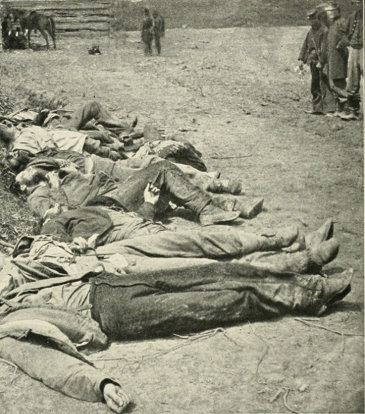
The Civil War eliminated
the jurisdictional boundaries
of the First Amendment
The "original intent" of the First Amendment was destroyed by the Civil War, which erased the state and federal jurisdictional boundaries by force. As a Constitutional legal matter, the "democratically" ratified Fourteenth Amendment contained two clauses -- called "equal protection" and "due process" -- which enacted in law what had already been written in blood. It made any previous jurisdictional boundaries (including the First Amendment) legally irrelevant. Those who say "we need to return to the original intent of the First Amendment" are saying, in effect, "we need to revisit the jurisdictional disagreements which led to the Civil War."
Blame Christians for civil government tyranny
Christians are the ones to blame for getting the civil government involved in marriage licensing to begin with. In America, this goes all the way back to the Puritans in the 17th century. Here is one of the earliest statutes in the Massachusetts Bay Colony:
[N]o person whatsoever in this jurisdiction shall join any persons together in marriage, but the magistrate, or such other as the general court, or court of assistants, shall authorize in such place, where no magistrate is near. Nor shall any join themselves in marriage but before some magistrate or person authorized as aforesaid. (1639)
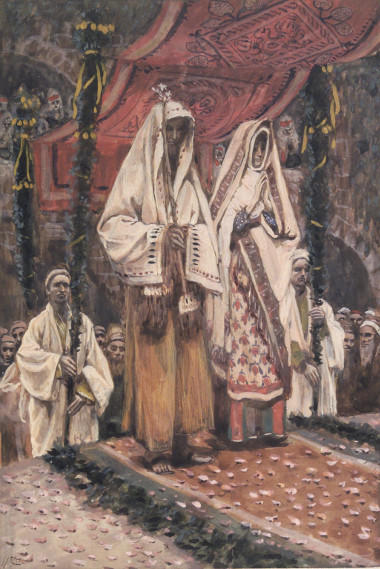
Where's your marriage license,
Joseph?
Notice that the Puritans didn't even allow "ordained ministers" to solemnize a marriage. But the Puritans are not the only ones to blame: many other Christian groups are responsible for the current government interference in marriage, and hardly any Christian seems willing to acknowledge fault on the issue. For example, the belief (held by many Christians today) that only "ordained ministers" can solemnize a marriage is itself a sinful, unBiblical addition to God's law (violating Deut. 4:2). If you hold this belief, then you must repent of it.
Did Joseph have to ask permission from the civil government (or get a license) in order to get married to Mary? Did Biblical law require anyone to get the civil government's permission before marriage? Did Jesus ever change Biblical law on this issue? Christians have gotten so far off the path of justice on the issue of marriage, many of them will never be brought back.
Christians supported the racist, unBiblical anti-miscegenation laws which prohibited interracial marriage and led directly to marriage "licensing." Christians supported the eugenics movement of the early 20th century which spread civil government marriage restrictions in many states.4 Christians applauded all of the special tax treatment granted to married couples which put unmarried people at a relative disadvantage. Christians generally supported the over "1000 federal government benefits and privileges" which accumulated for married couples only. All these sinful, unBiblical uses of civil government power led directly to the Obergefell decision.
Instead of trying to reduce government involvement in marriage, modern Christians "doubled-down," attempting to get the federal government to impose a definition of marriage on all the states (the 1996 Defense of Marriage Act and the (failed) 2006 Federal Marriage Amendment). The federal government finally did so, with the Obergefell decision.
Now, post-Obergefell, religious conservatives have figured out that they can no longer trust the federal government to enact their unBiblical religious views into law. Some Christians have foolishly continued to trust individual state governments. But it wasn't the U.S. federal government that was forcing people to bake cakes and take photographs. It wasn't the U.S. federal government that forced your children into government schools. It wasn't the U.S. federal government that forced you to get the permission of the State in order to claim that you are "married."
The civil government is not your savior
Fellow Christian, you never lost your "religious liberty" to do business with whomever you choose. You lost your "liberty" to do business with whomever you choose many decades ago (centuries ago in the case of certain businesses). And (beginning with the Puritans) your foolish Christian predecessors supported these losses of freedom wholeheartedly.
If you now invoke "religious liberty" arguments to protect yourself against the civil government, realize this: it is the same civil government to which you gave the power to usurp God's law. Sorry — you are too late. You get to live under the tyrant which your fellow Christians created. Read 1 Samuel 8:11-19, and get out your sackcloth and ashes. You were warned by your King: "With the judgment you judge, you will be judged. With the measure you measure, it will be measured to you."
Don't blame the "secularists" and humanists for using civil government power against you: Christians gave them the weapon of powerful civil government and spent the last 300 years teaching them how to (mis)use it. Now you have the opportunity to repent and remove that plank which has blinded you and your Christian brothers and sisters. Don't worry about the unbelievers who don't have God's law. Instead, confront those Christians who support the unBiblical powers of civil government (like price controls, subsidies, licensing, etc.). Show them from scripture where the civil government is overstepping its God appointed boundaries.
Liberty, not "Religious liberty"
Every civil law is an enactment into force of someone's religious belief. Take the sum of your civil government's laws, and you will understand its (current) "national religion." The current national religion of the United States bears no resemblance to Christianity. Some might argue that it never did.
Until the non-Christian religion of the United States changes, Christians will never recover the liberty that they threw away centuries ago. This will probably not happen without widespread cultural collapse, so the Christian remnant needs to repent, regroup, and reestablish a consistent legal understanding based upon Biblical law, not upon man's tradition (neo-Phariseeism).
Liberty and just-dealing can only be recovered locally now, within communities that agree to bypass the unjust judges (1 Cor. 5), or be willing to suffer the loss. We find ourselves back in the same situation as the early church within the rotting Roman Empire. Students of history can find hope in that comparison, as long as we jettison our neo-Phariseeism and return to a purer, Biblically-based understanding of church, family, and civil government.
Forget about the mythical "religious liberty." Start planning for true liberty. Start by solving your problems locally. Don't become unequally yoked with unbelievers (2 Cor. 6:14). Ignore the unjust civil government. Never accept its "help," "solutions," or subsidies. The church of Christ still has plenty of reforming to do; but the civil government is long past "reforming." It's time to prepare for its inevitable collapse by building peaceful communities based upon Biblical principles of justice and freedom.
Of course we won't all agree on these principles, but that is no problem: we Christians can live at peace with one another, simply by drawing jurisdictional boundary lines. If someone is willing to live peacefully in their own jurisdiction, then we must leave them alone. This principle (of political self-determination) flies in the face of modern thought (and Christian history), but it is Biblically right.
- 1. Many pastors have sold their free speech rights in exchange for the pottage of favorable tax treatment (501c3 corporate status). This is a known cause of paranoia.
- 2. This is why Supreme Court Justice Hugo Black, when he wrote the majority opinion in Torcaso v. Watkins (1961), labeled Buddhism, Taoism, Ethical Culture, and Secular Humanism as “religions”.
- 3. For example, all price control laws, all licensing laws, "Jim Crow" laws, and the Civil Rights act of 1964 (specifically Title II and Title VII). That's right, by forcing the racist business owner to do business with anyone, Christians removed their own business "liberty." I agree with Walter Williams:
- 4. See, for example, Christine Rosen's book Preaching Eugenics: Religious Leaders and the American Eugenics Movement, especially chapter 2
